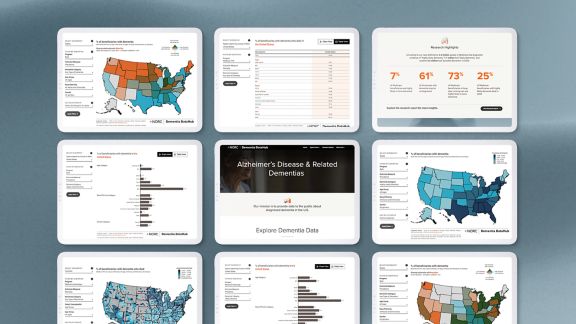Dementia DataHub: Visualizing Diagnosed Dementia in Medicare

Problem
Epidemiological information about dementia is badly needed in the United States.
Alzheimer’s disease and related dementias (ADRD) are brain conditions that impair brain functioning, causing progressive deterioration in memory, language processing, and bodily function, ultimately resulting in death. ADRD is the sixth leading cause of reported death in the United States and cost the U.S. health care system over $305 billion in 2020.
The United States has lacked a surveillance system for ADRD, limiting our understanding of its total burden and the distribution of this burden by demographic group and geography. The 2020 update to the National Alzheimer’s Project Act’s National Plan to Address Alzheimer’s Disease recognizes the need for increased surveillance of dementia, stating, “Data and surveillance efforts are paramount to tracking the burden … and assist with understanding health disparities among populations such as racial and ethnic minorities, low-income populations, rural residents, and sexual and gender minorities.”
Innovative surveillance systems based on secondary data sources can help the research community and public better understand ADRD epidemiology and plan public health services.
Solution
NORC created a surveillance system using Medicare claims and encounter data.
Medicare data on people diagnosed with ADRD can be used to estimate the prevalence, incidence, and other outcomes of ADRD. Medicare provides nearly universal coverage for people ages 65 and older, so it can provide highly accurate counts of people with diagnoses for ADRD, as most with the condition are older than 65.
However, the data have limitations. Existing case definitions of which diagnoses indicate ADRD are highly variable. Many dementia symptoms are unrecognized in clinical settings or lack a diagnosis code in the Medicare records that can be used to identify dementia. Diagnoses among people with dementia symptoms likely vary by race and ethnicity, gender, and geographic region.
To address these limitations, NORC first conducted a systematic review of published diagnostic code case definitions to create evidence-supported definitions that can be used for national surveillance. We are next validating the data, linking Medicare claims data to dementia assessment information contained in the Health and Retirement Survey. This validation will help us refine our case definitions in future system updates and estimate how many undiagnosed cases exist for every diagnosed case and how this rate varies by demography and region.
Finally, we engaged NORC’s experts in data visualization, geographic information systems, data privacy, and communications and website design to develop the Dementia DataHub, an intuitive, visually appealing website that allows access to and visualization of granular dementia data while safeguarding individual privacy.
Result
The Dementia DataHub is a one-stop online portal for project information and results.
Launched in September 2024, the Dementia DataHub provides the nation with the first geographic estimates of diagnosed dementia prevalence, incidence, payments, mortality, and COVID-19 infection among people with diagnosed dementia. The system offers access to summary research information and interactive dashboards and maps of results at the national, state, and county levels. The maps allow users to explore research hypotheses by relating system indicators to area-level summary information on social determinants of health and health indicators. The system’s public use files allow users to download results aggregated by county and link these estimates to other data to conduct analyses. All data and files contained in the system have been reviewed and certified for public release by NORC’s state-of-the-science Disclosure Review Board.
The project also published the methods and results used to develop its case definitions in the peer-reviewed journal JAMA Open Network.
In subsequent years, the Dementia DataHub will expand to include new indicators and data sources, information obtained through the project’s validation study, and research on drivers and determinants of geographic variation in dementia outcomes.
Explore Dementia DataHub
Use the interactive dashboards and maps to view dementia diagnoses among Medicare beneficiaries, with results available at the national, state, and county levels.
Related Tags
Project Leads
-
David Rein
Senior FellowPrincipal Investigator -
John Wittenborn
Senior Data ScientistProject Director -
Kan Gianattasio
Senior Research ScientistAnalytic Lead -
Peter Herman
Senior Research MethodologistData Visualization Developer -
J. Gordon Wright
Digital DirectorDigital Strategy Lead












